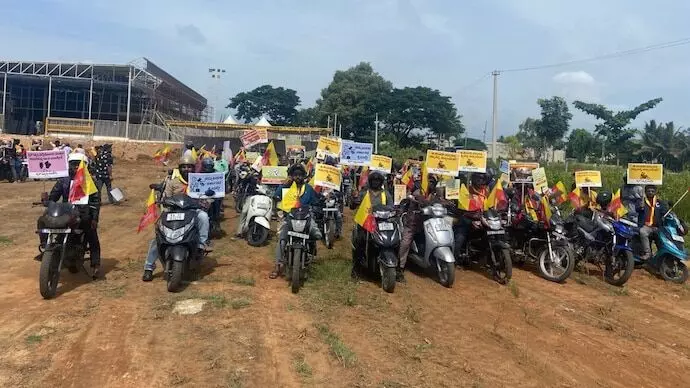Over 5,000 bike taxi riders gather in Bengaluru, demanding the ban be lifted

Over 5,000 bike taxi riders from across Karnataka gathered at Bengaluru’s Vidhana Soudha on Saturday, riding together in a massive show of unity to urge the government to lift the ban on bike taxis and put in place a clear regulatory policy.
Riders came from cities like Mysuru, Mandya, Hassan, Davanagere, Tumakuru, Ramanagara, Shivamogga, and Kanakapura to take part in the peaceful protest. For many, this is not just about their jobs—it’s a fight for survival.
Ramesh, a rider from Tumakuru, shared his struggle: “Before the ban, I earned enough to support my family. Now, there’s no income. We’re skipping meals, and my child’s school fees are overdue.”
The ban has hit hard, affecting over six lakh people across Karnataka who relied on bike taxis to make a living. Many families are now struggling with poverty, unable to pay rent, buy groceries, or keep their children in school.
Ravi, a rider from Mysuru, said, “I have a wife and two kids depending on me. Rent is unpaid, the electricity bill is overdue. I’m borrowing just to get by. This ban hasn’t just taken away our jobs—it’s taken away our dignity.”
Commuters are feeling the pinch too. Without bike taxis, travel costs have risen, and last-mile connectivity has become a problem in many cities and towns.
The riders argue that Karnataka should follow the lead of 19 other states that have introduced policies to regulate bike taxis safely. They say a well-thought-out policy could protect passengers, regulate driver behavior, and bring back livelihoods to hundreds of thousands of families.
Priya, a rider from Mandya, put it simply: “This isn’t just about earning money. It’s about keeping our families alive. We’re ready to follow rules—we just need a chance to work.”
### Bike Taxi Association Demands Reversal of Ban
On Thursday, 110 riders from the Namma Bike Taxi Association handed over a petition to Karnataka’s Health Minister Dinesh Gundu Rao, demanding official recognition for bike taxis. The delegation also raised concerns about harassment from auto unions, saying that union leaders were even blocked from protesting the ban.
Mohammad Salim, union president, said, “My phone won’t stop ringing—250 to 300 drivers call me daily for help. We don’t want chaos, just regulation. We need a policy, not a ban.”
The petition follows open letters sent to Karnataka Chief Minister Siddaramaiah, Congress chief Mallikarjun Kharge, and MP Rahul Gandhi—none of whom have responded yet.
Salim added, “Last year, over eight crore bike taxi rides happened in Karnataka. We’re not asking for favors, just the right to work legally and safely.”
### What Led to the Ban?
In April, the Karnataka High Court upheld a government order declaring bike taxi platforms like Rapido, Ola, and Uber Moto illegal due to the absence of clear regulations. The ban officially came into effect on June 16, affecting the livelihoods of around six lakh people.
Companies like Ola, Uber, and Rapido have challenged the ruling, with the High Court scheduled to hear the case again on June 24.
### Riders and Commuters Struggle
Since the ban, riders are facing mounting difficulties.
A 37-year-old rider shared, “I’ve had to borrow money twice this month. My daughter’s school fees are pending, and I have nothing left.”
Another rider working for Ola and Uber said, “Delivery partners can use the same bike for food deliveries, but I get fined for giving someone a ride. It doesn’t make sense.”
Commuters are also feeling the impact. Sneha, a 19-year-old college student, said, “Auto fares have doubled. I used to pay Rs 50 for a bike taxi; now autos charge Rs 100 to Rs 150 for the same distance.”
Sandeep, a tech professional, added, “There’s no last-mile connectivity to most metro stations anymore. Bike taxis filled that gap. Now I spend twice the time and money.”
Bala, a daily commuter, questioned the government’s decision: “Why ban something without consulting the people first? There should have been a public discussion or poll.”
Though the central government’s Motor Vehicle Aggregator Guidelines of 2020 officially recognize bike taxis, Karnataka has yet to create its own rules. The state introduced an Electric Bike Taxi Policy in 2021 but withdrew it last year without explanation.
For now, thousands of bike taxi riders and their families wait anxiously for a solution, hoping the government will listen and bring back a lifeline that means the difference between survival and despair.
